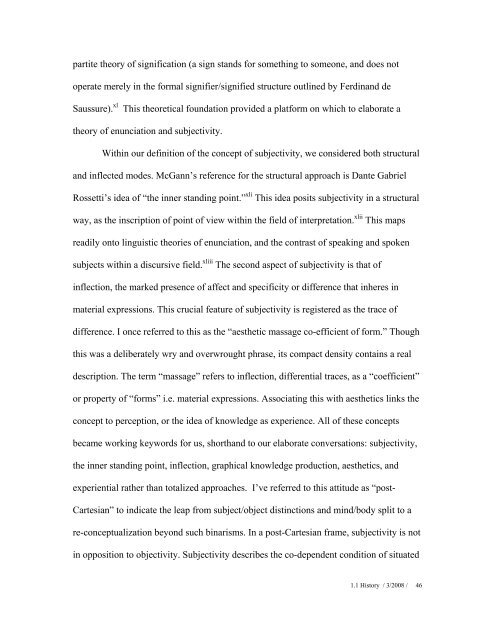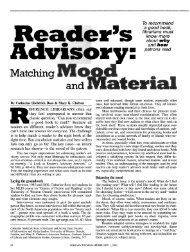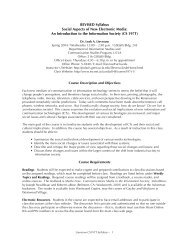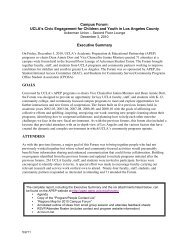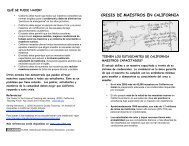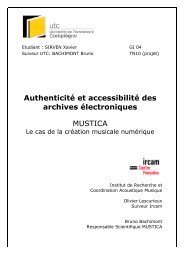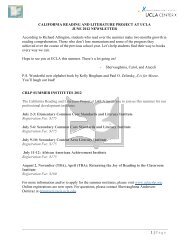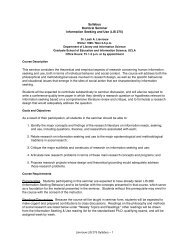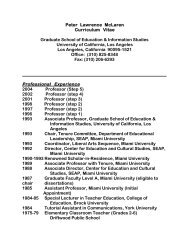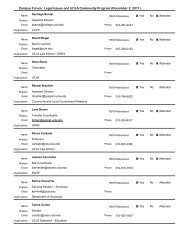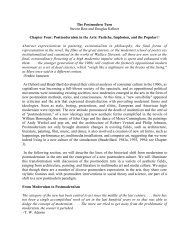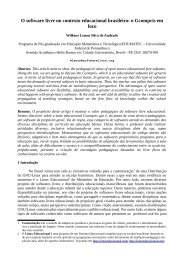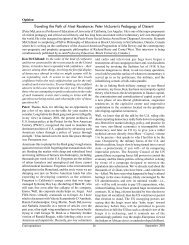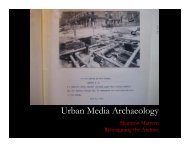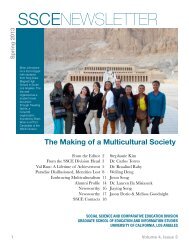1.1 From Digital Humanities to Speculative Computing - UCLA ...
1.1 From Digital Humanities to Speculative Computing - UCLA ...
1.1 From Digital Humanities to Speculative Computing - UCLA ...
You also want an ePaper? Increase the reach of your titles
YUMPU automatically turns print PDFs into web optimized ePapers that Google loves.
partite theory of signification (a sign stands for something <strong>to</strong> someone, and does not<br />
operate merely in the formal signifier/signified structure outlined by Ferdinand de<br />
Saussure). xl This theoretical foundation provided a platform on which <strong>to</strong> elaborate a<br />
theory of enunciation and subjectivity.<br />
Within our definition of the concept of subjectivity, we considered both structural<br />
and inflected modes. McGann’s reference for the structural approach is Dante Gabriel<br />
Rossetti’s idea of “the inner standing point.” xli This idea posits subjectivity in a structural<br />
way, as the inscription of point of view within the field of interpretation. xlii This maps<br />
readily on<strong>to</strong> linguistic theories of enunciation, and the contrast of speaking and spoken<br />
subjects within a discursive field. xliii The second aspect of subjectivity is that of<br />
inflection, the marked presence of affect and specificity or difference that inheres in<br />
material expressions. This crucial feature of subjectivity is registered as the trace of<br />
difference. I once referred <strong>to</strong> this as the “aesthetic massage co-efficient of form.” Though<br />
this was a deliberately wry and overwrought phrase, its compact density contains a real<br />
description. The term “massage” refers <strong>to</strong> inflection, differential traces, as a “coefficient”<br />
or property of “forms” i.e. material expressions. Associating this with aesthetics links the<br />
concept <strong>to</strong> perception, or the idea of knowledge as experience. All of these concepts<br />
became working keywords for us, shorthand <strong>to</strong> our elaborate conversations: subjectivity,<br />
the inner standing point, inflection, graphical knowledge production, aesthetics, and<br />
experiential rather than <strong>to</strong>talized approaches. I’ve referred <strong>to</strong> this attitude as “post-<br />
Cartesian” <strong>to</strong> indicate the leap from subject/object distinctions and mind/body split <strong>to</strong> a<br />
re-conceptualization beyond such binarisms. In a post-Cartesian frame, subjectivity is not<br />
in opposition <strong>to</strong> objectivity. Subjectivity describes the co-dependent condition of situated<br />
<strong>1.1</strong> His<strong>to</strong>ry / 3/2008 /<br />
46


